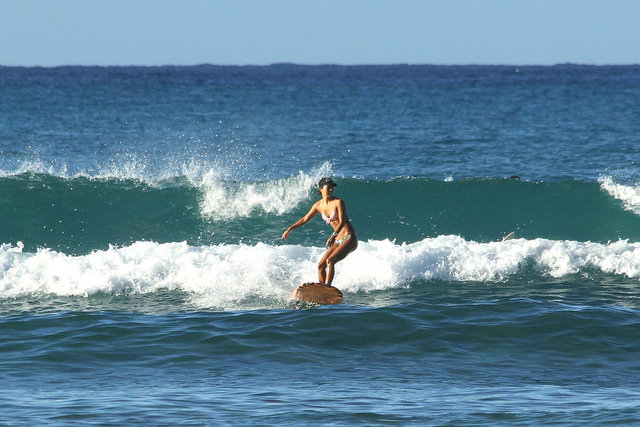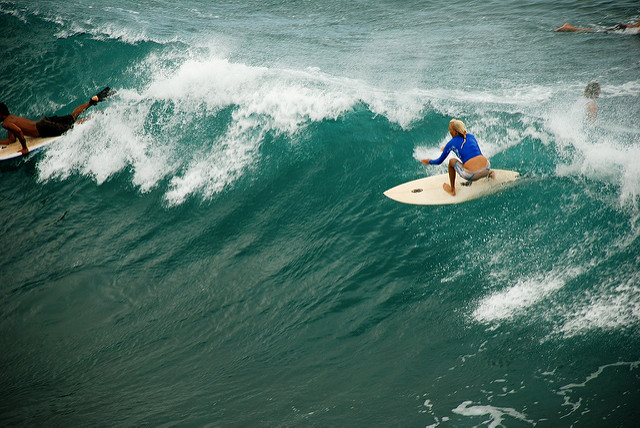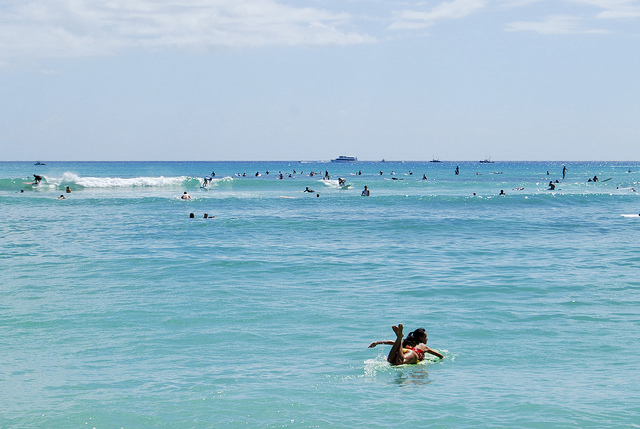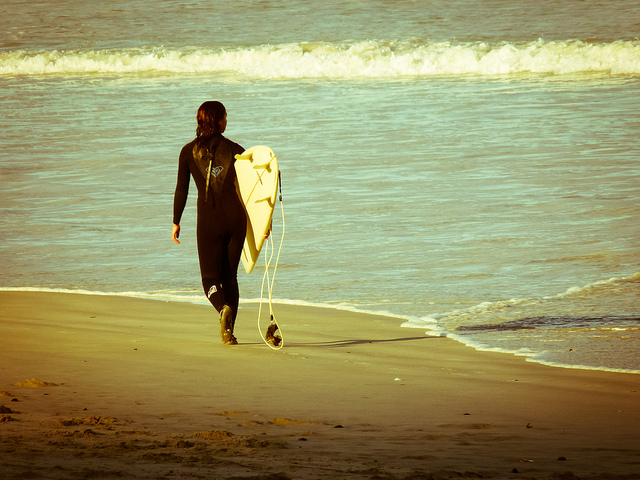
Sophie Berti’s “Waterlogged”: Nonfiction First Prize Winner, Women in Water Writing Contest

WATERLOGGED
by Sophie Anne Berti
My mom comes back from Italy and the first thing she wants to do is go surfing. She’s sick and jet-lagged, but the ocean’s call is stronger than her bed’s, stronger than the weights that are attempting to bring her eyelids to rest.
“How was the surf while I was gone?” she asks as we load our surfboards into her van. “Did you get in the water?”
There was a groundswell running for a few days, and my husband and I surfed while the sun set beside us. The waves were glassy in the low light, hard to read but easy to feel. We left in the dark, other surfers still in the water.
“I heard about that swell,” she says. Her Facebook friends posted about it, and one of her surfing buddies texted her a report. She was eight hours and a continent away, but she had to know what was happening in the water back home.
It’s not that she didn’t enjoy her vacation, because she did. It was her and my dad’s first trek to Europe, a trip they’d carefully planned, a trip their friends had given them list upon list of recommendations for. You have to go to Florence. Cinque Terre is a must. You should stay in this bed and breakfast. Bring scarves, bring walking shoes, eat this, do that. My parents like recommendations. They gather new information like a sea-goer collects shells and sea glass, saving what sparkles and holds their interest. Armed with these shining facts, they ate pizza in Florence, drank wine in Tuscany, walked the Dolomites while being serenaded by cowbells. They felt history under their feet. “It was great,” my mom says. “I want to go back. Now, where should we go?”
We drive south.
The winds are onshore and the parking lot is close to full, so we decide to check the conditions before putting on our suits. Down at the beach, I see my friend Billy stepping out of the water, his teenaged German Shepherd, Charlie, dancing around his legs. “It’s worse than it looks,” he tells me when I ask how his session was. “The waves are slow and the people are kind of lame.” Charlie barks at us, a high-pitched, pay attention to me! kind of bark, and Billy throws a stick for him to chase. “I caught two waves and got out.”
The waves do look soft, their lines disorganized—no groundswell in the water now, just short interval wind swell, lumpy lines that peak in seemingly random locations and rush to break in front of themselves—but I must be in the right mood for this; I’m noticing that there are, at least, a lot of waves to go around. I’m noticing that the onshore flow isn’t strong enough to crumble the waves or ruin their shape, and that the sun is strong and glittering off the ocean’s surface in an enticing invitation. It’s hot and the ocean is there, right there. I want to be in the water. My mom is down the beach talking to someone she knows, and when she sees me looking for her she makes a motion toward the trail leading back to the parking lot. Let’s go get changed. Let’s surf. I nod.
Another day and I might be saying Billy’s sentiments to someone else. Terrible waves, annoying people. Not worth the drive. He isn’t wrong or being negative, exactly. He’s smiling, playing with his lumbering dog and telling me about his new job, and the girl he wants to marry. I haven’t seen him for a good long while, so catching up with him feels special, like paddling into the best wave of a set without challengers in the wings. Another day and I’d stay until we were chatted out, then leave to attempt productivity, but I must be in the right mood for
this; my mind is already back at the van, turning my wetsuit right-side-out, searching out wax to touch up my longboard’s deck before dashing down to the beach.

Image by Prayitno.
“You’re not going to find anything better,” Billy says when I tell him I’m going to stay and surf. “Go get a few!”
The water feels like heaven, like home, like a new adventure. It feels warm, too—unusually so. There’s little
adjustment between water and air but for the promise of surf, which is in itself refreshing. Paddling out, I notice a girl who I’ve met from surfing the inside cove of this point. It’s the only place in the world that I’ve ever seen her. She smiles sunnily as we glide into the lineup, and I can’t help but state the obvious—how freaking warm is this water?
“I know,” she says. “I was going to try and stay mostly dry for the first hour, but it’s way too hot and the water’s barely cooling me off.” She’s wearing a t-shirt and small board shorts, her long black hair dripping down her back. “I don’t remember the water ever being this warm, for this long. It’s weird, but I can’t complain!” Her smile is huge and contagious, but her words skim over some disturbing ideas. With the warm water comes big questions: What’s happening to the ocean? What’s happening to the life below the surface of the water? Already we’ve been seeing species of fish that are foreign to these parts. There have been more shark sightings than normal, and more attacks.
Are these flukes soon to be standard, a symptom of our changing globe, or are they due to El Nino, and things will go back to the way they were before? I sit on my board, watch a set approach, and wonder what the conditions are going to be like next year, in five years, ten years. I think about the increased chance of a shark bite. I can’t begrudge the sharks anything—the ocean is theirs, after all. They don’t have a choice about where
they can and can’t exist. Sometimes I feel that way, too, that I’ll dry up if I spend another day out of the water; I know it’s not true. I would survive, but what kind of life would that be?
The temperature of this water, salty and alive and rolling beneath me, is amazing to swim in and frightening to ponder. It makes me think that anything is possible, for good or for bad.
My mom paddles up, her face beaming and content. She’s trying out her friend Ken’s board. “It’s really buoyant,” she says. “I’m not sure what to do once I stand up but it’s fun!” She’s glowing underneath her hat. She and I learned to surf around the same time, about ten years ago when I was still in high school. It’s hard to imagine a life before surfing; it’s hard to imagine my mom without thinking of her surfing. She works twelve-hour days as a critical care nurse, and devotes her days off to the sun and the ocean. “I want to surf as long as I can,” she often says. “All the years that I can.” Maybe if she surfs and surfs and surfs in the present, a future in which her older body can no longer ride waves won’t be so terrible. Maybe she’ll be waterlogged by then, and satisfied. I want to feel like that, too, and exist in the water while I still can.

Woman surfing image by Courtney Nash.
We catch waves in turn, some taking more turns than others. I’m surprised that Billy didn’t have a good time surfing, because I certainly am. Still, I think, I must be in the right mood for this. Moments and motions flow easily—paddling to gliding, to standing, to turning, cross stepping, stepping back, stepping up, kicking out, and then to paddling again. I notice something floating in the line up, probably driftwood. I catch a wave. I paddle. I catch a wave. I paddle.
I see my good friend, Amy, paddling from the bottom of the cove up towards where I’m sitting. I’ve known her since 3rd grade, know her face so well I could hardly describe what she looks like. To me, she looks like Amy, like laughter, like music. The last time I saw her, we met at the beach a few miles north of here. There wasn’t any surf, so we brought along our journals and books and proceeded to ignore both while we talked. The water was warm then, too. We soaked up sun and then submerged ourselves in the sea to reset our bodies. Once, under
the cover of the water, I took my bikini off.
“Amy! Look!” I waved the top around over my head, its strings bouncing and raining water back into the ocean. We giggled like we were in 3rd grade.
“I want to do it too!” She took her bikini off. We clutched our bathing suits and laughed. I glanced around the beach, but no one was close enough to see our unclothed state. And if they were? I let myself not care, because this felt too delicious.
I’d never been naked in the ocean before, at least not to my conscious memory, and I was surprised at how much freer I felt without the confines of my not very big bikini top and bottoms. A barrier, no matter how small, is still a barrier.
Now Amy and I grin at one another in greeting, ask how the other is doing. She falls into the rhythm of the ocean, catching waves and paddling and waiting and catching another. I keep noticing the shape bobbing in the water, blacked out from the sun’s glare, and so finally I paddle over to check it out.
It’s…fleshy. My first thought is that it’s a piece of meat. Bigger than both of my fists put together, it’s not bloody or shredded, but appears to be intact. It reminds me of when my cat eats every part of the mouse, barring a piece of the offal.
“We were wondering what that was,” says a surfer who’s been sitting next to the flesh-colored thing. “An organ, maybe?”
That makes sense, except that the object is so complete. What sea creature has the wherewithal to eat everything but this one part, leaving it as untouched as my cat would? Maybe I’m not giving it—what, the seal? The shark?—enough credit. I’m not a marine biologist, and anything is possible, right? All bets are off.
We shrug with our expressions. Whatever the object is, it’s creepy.

Image by Emily Leung.
More waves come through. My arms are getting tired and my stomach is nudging me for sustenance (cookies). There’s no point leaving the water until my mom is ready to go, though, because it’s nicer in the ocean than on the shore.
I see another meaty organ thing after my next wave. “Have you seen these?” I ask Amy.
“What? Oh. Ew. What is that?”
“Maybe an organ?” says a person cruising by. It seems that’s our only idea.
Why? Why are these identical organs floating around, bobbing like once-living buoys? I spot a third. Three? How could there be three of the same organ, all untouched by teeth, all intact, all here?
My mom has returned from her paddle up the point. She’s on her own board now, and I can tell she’s getting tired. Her energy level hasn’t come back to its full power yet, but I can still feel her joy at being back in the ocean.
“Check out these..this thing,” I say, waving her over to one. “Have you seen one before?”
“What things? Oh. Um. It’s a sea cucumber.”
“A sea cucumber! Of course.” That makes sense.
But then it doesn’t. I’ve never seen them floating in the lineup here. I haven’t seen them at any beach in this area, let alone bobbing along the ocean’s surface like a fish that’s gone
belly up. “
Look at it, it’s all bloated,” she says.
“There’s more,” I say. “At least two others.”
“Why?” she muses, shaking her head. “What happened to them?”
We can hardly dip beyond the surface of what’s really happening. The answers I try to come up with—maybe an algae bloom that only affects sea cucumbers? Maybe some kind of disease or infection? Could the water be too warm for them?—are not only unfounded, but unsettling. Whatever’s the answer, something odd has happened, that much is obvious. Whether it’s a fluke soon to standard, I can’t say.
I’ve met some of my best friends, including my husband, while in the ocean. It’s helped my relationship with my mom grow beyond mother-daughter to true friends and fellow adventurers. Whatever irritations or darknesses we feel, we can always count on the ocean to refresh our brains and hearts. The ocean has its own siren call, welcoming us to a new home and a new community.
How to return the favor, all the joy it’s given us?
Is that even possible?
Every surf session is a new experience. It’s like traveling to a foreign country, one that’s full of deep history and old magic. The ocean is at once knowable and mysterious, much like the thoughts of a good friend. It’s difficult to truly know what’s happening in the heart of another, but you can remind yourself to try and know that heart, and to do all you’re able to protect that heart.
After surfing, my mom and Amy and I go out to lunch together. We talk about Amy’s new friend, how they met through a shared ex-boyfriend, and about the kitchen remodel my parents want to do. My mom’s hair is alive with seawater and sunshine; Amy’s cheeks are sunburned, her eyes bright. They are both so beautiful. I am lucky to know them; I am lucky to learn about them. The ocean made it possible for us all to be here, now,
salty-skinned and relaxed. It has a bewitching and long reach, this ocean of ours. It must be magical, and that’s worth protecting, worth everything.
What shining fact does the ocean want me to know?
Anything is possible.

Image by Antonio Olmedo.
Read about the rest of the winners of the Women in Water writing contest here.
Main image by Mike van Dalen.




